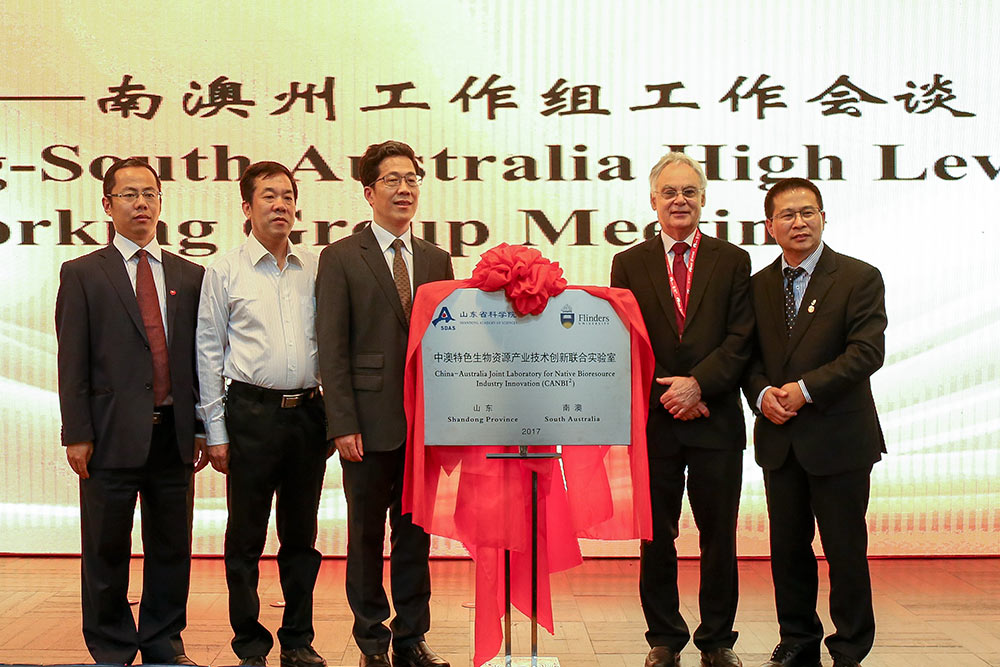
A joint agreement to conduct bold and innovative research into marine and terrestrial biotechnology products has been signed by Flinders University and Shandong Academy of Sciences in China.
The new joint laboratory, officially established during this month’s South Australian State Government business mission in China, demonstrates a shared commitment to apply evidence-based collaborative research to solve critical industry problems and will also expand key R&D links between South Australian universities and the Shandong Academy of Sciences.
The China-Australia Joint Laboratory for Native Bioresource Industry Innovation (or CANBI2) will lead to a five-year collaboration between the Shandong Academy of Sciences and Flinders University to research and develop native Australian biological resources into environmentally and ecologically friendly products and technologies.
Professor Yinglong Wang, President of the Shandong Academy of Sciences, says the joint lab represents an innovative model for international partnerships in research and development, and commercialisation.
“I am confident that this joint lab will be a great success in delivering the industry outcome through innovation and commercialisation for both Shandong and South Australia in the years to come,” Professor Wang says.
Flinders University Deputy Vice-Chancellor (Research) Professor Robert Saint says Flinders has a proud and proven track record of working for and with the biotechnology industry in Shandong Province.
“From the development of a calcium rich dietary supplement derived from seaweed to exciting possibilities in nutraceuticals, Flinders has established itself as a research leader in harnessing the potential of the oceans through the establishment of the first centre for marine bioproducts in the southern hemisphere – with investment-ready projects in this area, and further projects in the pipeline,” Professor Saint says.
“We’re also active in the development of bioproducts from land-based resources and this agreement advances our interests in their field.
“This latest agreement has gone a long way in strengthening the dialogue and innovation ties between not only Flinders and the Shandong Academy of Sciences but also South Australia and Shandong.”
The research will be conducted at Flinders University’s Centre for Marine Bioproducts Development (CMBD) in Adelaide, and at Shandong Academy of Sciences facilities in Jinan.
Flinders researchers will work with the academy’s Biology Institute which is developing novel food processing technology, and research and development in marine-derived bioactive substances, health food, special medical food, and biomedicine.
They also will collaborate with the Shandong Analysis and Test Centre which has leading technological capacity in natural product research and development, key technology and standard in traditional Chinese medicine modernisation.
At Flinders, the CMBD has advanced research into the biorefinery and industrialisation of marine biological high-value products including local seaweed, microalgae, sea sponges, rocklobster, sea cucumber and various land-based plants and natural resources.
Much of this Flinders research is ready for commercialisation with a Chinese investor or partner, says CMBD director Professor Wei Zhang.
“We are delighted to be part of a bold new initiative to cooperate with research and industry partners in China in this emerging field,” says Professor Zhang. “The aim of this collaboration is to promote the international commercialisation of native biological resources in both Shandong and South Australia.”
SA currently exports more than $2.2 billion worth of goods to China a year. After wine, further trade opportunities are in education and training, R&D collaborations, water, agribusiness, health and aged care and culture.
This week’s delegation involved 182 delegates from 124 businesses and organisations, including Flinders University.
The Minister for Trade and Investment, Mr Martin Hamilton-Smith, made the announcement at the joint South Australia-Shandong Science and Commercialisation Symposium, organised by the South Australian Government, Shandong’s Science and Technology Department and the Shandong Academy of Sciences in Jinan.
The symposium coincides with the establishment of a new science and technology sub-committee under the South Australia-Shandong Friendly Cooperation Agreement, announced by Premier Mr Jay Weatherill and Shandong’s Vice Governor Mr Gong Zheng.
The Minister also witnessed the signing of two Memoranda of Understanding (MoUs) established under the Shandong-South Australia Science, Technology and Commercialisation Partnership Platform Agreement, taking to eight the number of MoUs signed under the platform since September 2016.
One of the new MoUs, between the Academy and Flinders University, relates to research into medical devices and digital health, and the other, between the University of South Australia (UniSA) and the Academy, involves fibre optics and advanced sensors research.
“The first joint laboratory for the establishment of a biotechnology industry, between the Flinders University Centre for Marine Bioproducts Development and the Shandong Academy of Science, is a perfect example of a win-win,” says Mr Hamilton-Smith.
“For the Shandong Academy and the Shandong Government marine science is an area of strategic importance due to the high priority on the blue economy, and terrestrial bioproducts present untapped potential,” he says.
“For Flinders it is a chance to collaborate with some of the world’s best researchers and deliver benefits society needs, as we continue to make a difference.”
For more information about South Australia’s strategic relationship with China, visit the Department of State Development’s website.

